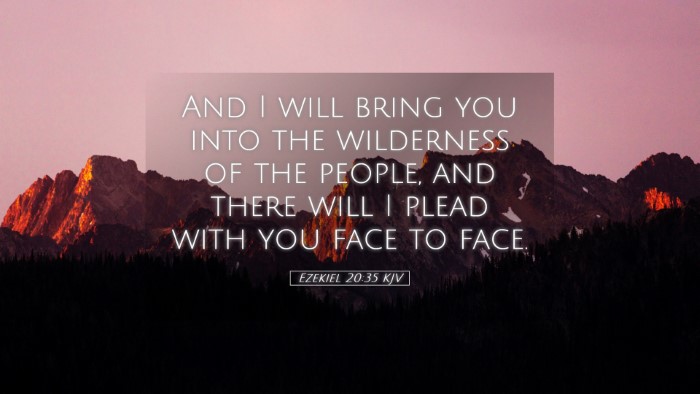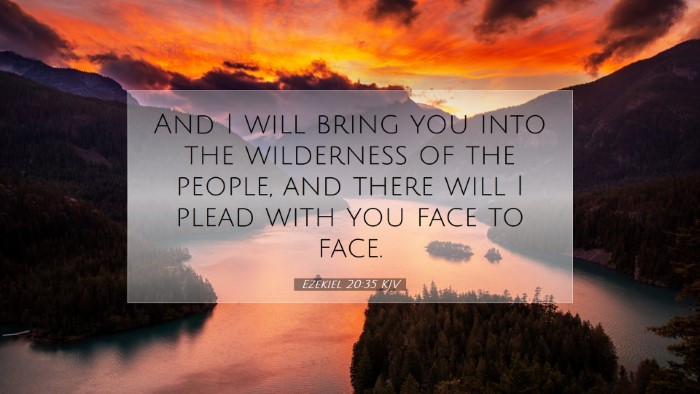Ezekiel 20:35 - Commentary and Insights
Verse: "And I will bring you into the wilderness of the people, and there will I plead with you face to face."
Introduction
Ezekiel 20:35 serves as a crucial transitional moment in the prophet's narrative. As the Lord speaks through Ezekiel, this verse encapsulates a divine summons for Israel to undergo a moment of reckoning and restoration. The wilderness imagery evokes both physical and spiritual themes that are rich for exploration, drawing insights from the historical context and prophetic literature.
Contextual Analysis
The backdrop of this passage is Israel's persistent rebellion and idolatry. Matthew Henry emphasizes that God's complaint against Israel is rooted in their failure to honor the covenant established with Him. The "wilderness of the people" metaphorically suggests a place where God will draw out His people to confront them about their disobedience and to purify them for restoration.
The Wilderness: A Theological Symbol
Albert Barnes notes that the wilderness is both a literal and figurative space where God interacts with His people. This place of desolation becomes a location for renewal and confrontation. Historically, the wilderness represents a space of testing and preparation, as seen in the experience of the Israelites in Exodus, as well as the ministry of Jesus in the Gospels.
God’s Pleading: Face to Face
The phrase "plead with you face to face" invokes the imagery of direct engagement between God and His people. Adam Clarke elaborates on the intimacy and seriousness of such communication. In this context, God seeks to restore relationship rather than to merely judge. This face-to-face interaction underscores the gravity of Israel's moral and spiritual condition while offering the hope of reconciliation.
Implications for Spiritual Leadership
For pastors and spiritual leaders, Ezekiel 20:35 carries significant insights about accountability and pastoral care. Just as God calls Israel to the wilderness for examination, leaders are reminded of the necessity to confront difficult issues within the community. This entails guiding congregations to reflect upon their faithfulness and commitment to God amidst contemporary challenges.
- Encouragement of Self-Examination: Leaders should encourage congregational self-reflection on their walk with God.
- Facilitating Conversations: Like God’s direct plea, fostering open dialogue about tensions within the community is essential.
- Emphasizing Restoration: The outcome of such confrontations should always point towards reconciliation and restoration.
Spiritual Application for Believers
For individual believers, this verse resonates with the call to seek God authentically. The wilderness serves as a metaphor for the spiritual journeys that require solitude, reflection, and divine encounter. This reflects the personal aspect of salvation and sanctification.
- Embracing Solitude: Personal wilderness experiences are opportunities to grow closer to God.
- Confronting Idolatry: Believers are challenged to identify and repent from what distracts them from God’s presence.
- Seeking Intimacy with God: Each person is invited into a deeper relationship with God through humble seeking.
Conclusion
Ezekiel 20:35 serves as both a warning and a profound opportunity for restoration. The call to the "wilderness of the people" is not merely a physical journey but a spiritual summons to return to authentic relation with God. As such, this verse speaks powerfully to the heart of pastoral ministry, individual faith, and the overarching narrative of redemption throughout Scripture. The insights drawn from public domain commentaries enhance our understanding, calling both leaders and laity to intentional reflection on their faith journeys as they seek God’s face in the wilderness.


